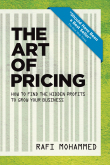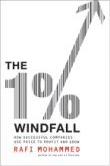Will “Harry Potter” Retail Prices Kill the Independent Bookstore?
While much of the world waits in suspense to learn which characters will die in the final installment of the Harry Potter book series, I’ve been wondering if the fierce discounting of blockbuster books like J.K. Rowling’s “Harry Potter and the Deathly Hallows” is going to kill small independent book stores. Many small book store owners are upset because they supported J.K. Rowling before she became the wealthiest woman in Britain. But because big discounters have decided to set low prices, the booksellers that helped create the Harry Potter phenomena are being left out of today’s profit equation. Some retailers are selling the $34.99 list price Harry Potter book for as low as $17.99…pennies above the wholesale price.
The pricing strategist in me advises small book stores, who can’t compete on price, to focus on other areas of value to attract customers. In the case of Harry Potter, they can emphasize the extra value of a release party, not requiring pre-orders, and the benefit of reading the book at midnight on Friday instead of when the postman rings on Saturday. While this all sounds great…let’s face it…small bookstores are being hurt by aggressive discounters.
Publishers may have a financial interest in supporting small book stores. Historically, small book sellers have been integral in supporting and nurturing new authors before their books show up on bestseller lists. These typically passionate booksellers recommend “up and coming” authors to their influencer (to use a “Tipping Point” metaphor) customers as well as host book readings. If aggressive discounting hurts small booksellers – who are key to developing future J.K. Rowlings (and corporate profits) - publishers need to find ways to support them.
One possible avenue to support small independents is to impose minimum retail prices on blockbuster books. The U.S. Supreme Court recently ruled it legal for manufacturers to set minimum retail prices. Since this ruling was just made – so it’s not applicable to this week’s Harry Potter release. But for the next $34.99 list price blockbuster, the publisher may want to consider setting a minimum retail price of say, $25. This would help small bookstores, integral players in the publishing value chain, stay in business. In addition to keeping the new author development pipeline intact, this pricing strategy would help ensure that no bookseller becomes too powerful. An 800 pound gorilla retailer could be a pain to deal with as well as raise prices when competitors close their doors.
I’m conflicted about the idea of setting minimum prices – it’s open for discussion. In the short run, consumers lose because minimum prices would prevent “break even” and loss leader sales. Publishers would lose some sales due to higher retail prices. But in the long run, consumers and publishers may benefit from new authors (nurtured by independent bookstores) as well as a more balanced bookselling market. Is paying a $7 premium today ($25 vs. $17.99) worth it to society in the long run? Please let me know what you think!
Readers' Comments on This Blog Entry
Jon- I liked that movie! Just to be clear, I am interested in understanding if minimum prices should be set to protect high service retailers that add value to a product - the retailer is part of the value chain.





Sounds a bit like the plot for "You've Got Mail" :-)